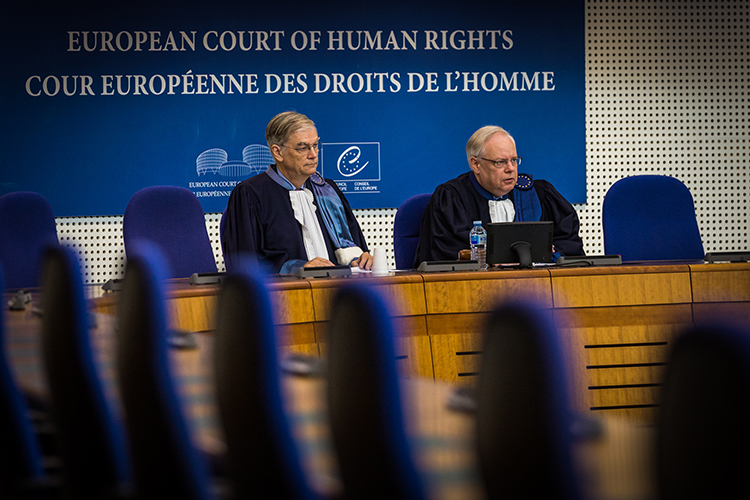Stories of foreign criminal deportations stopped over a child’s taste for (opens in a new window)chicken nuggets, or having a (opens in a new window)pet cat, have fuelled the debate. These stories ((opens in a new window)although (opens in a new window)debunked) give the impression that human rights law undermines border control on the most trivial grounds.
Suella Braverman, who as Conservative home secretary was one of the most vocal advocates for leaving, has (opens in a new window)laid out a 56-page plan to do so. Current Conservative leader Kemi Badenoch has commissioned a (opens in a new window)review into whether the UK should leave the ECHR and other international legal agreements.
But there are alternatives to leaving entirely. Labour justice secretary Shabana Mahmood has signalled plans (opens in a new window)for reform with a focus on foreign criminal deportations. On a visit to Strasbourg in June, Mahmood (opens in a new window)suggested that there is a perception that “the law too often protects those who break the rules, rather than those who follow them”.
Other signatories to the convention are concerned too - though none have called to leave it. In May 2025, nine countries led by Italy published an (opens in a new window)open letter calling on the European Court of Human Rights to “restore the right balance” between migration and the ECHR. They want states to have “more freedom” to tackle irregular migration and expel foreign national criminals.
How does the ECHR work?
It’s important to note that the ECHR has no right to asylum, nor a right to enter or remain in a country of which you are not a national. Deporting someone back to their country or to a (opens in a new window)safe third country does not violate the ECHR.
However, in exceptional cases, a person can challenge their removal on human rights grounds under the convention in UK courts or – (opens in a new window)very rarely – in Strasbourg. These are the cases that the UK is concerned about.
There are, generally speaking, two routes to this. A person may challenge their removal under (opens in a new window)Article 3 of the convention (prohibition of torture and other severe ill-treatment) if, for example, there is a serious risk that they may be tortured in the country to which they would be sent.
Or they can do so under (opens in a new window)Article 8 (the right to respect for private and family life). For example, if they have children who are entirely dependent on them and unable to leave with them.
Article 3 is an absolute right: nothing can justify the use of torture or allowing a person to be tortured. Article 8 is a qualified – not absolute – right. It can be (opens in a new window)limited where this is lawful, proportionate and necessary to protect the wider public interest. Deporting a foreign national who has committed a criminal offence could be such a case.
If a person believes their rights have been violated through being deported, they can make an (opens in a new window)application to the European Court of Human Rights, but only if they have exhausted every domestic route in their national courts. This is not an appeal, and the court cannot overturn a domestic judgment or invalidate national law. However, a negative judgment legally obliges the member state to stop the violation and ensure it does not happen again.

Though no longer home secretary, Suella Braverman has continued calling for the UK to leave the ECHR Credit: Simon Dawson / 10 Downing Street
Judgments by the European Court of Human Rights against the UK are (opens in a new window)rare. Since 1980, there have been only (opens in a new window)four cases where the court ruled that the UK violated the right to family life in a deportation case.
Within the UK, while information on how many foreign national criminal deportations have been stopped on human rights grounds is scarce, the (opens in a new window)most recent available data suggests that only (opens in a new window)2.5% of Article 8 appeals against deportation (or 645 cases over six years) were successful in UK courts. Some of these could have subsequently been overturned, but that information is not publicly available.
How could it be reformed?
As governments throughout Europe look for ways to manage migration, some states are looking at reforming the ECHR on a Europe-wide level.
The text of the convention can be (opens in a new window)amended with the unanimous consent of all 46 members of the Council of Europe. This would likely take years to negotiate and come into force.
Alternatively, member states can issue a joint declaration to (opens in a new window)try to influence how the court interprets the convention. This might, for example, call for greater deference to national decisions related to migration and the right to family life.
While it’s certain that many states have concerns regarding migration, they might not necessarily have the same view on what to do about it. Denmark led an effort on ECHR reform in (opens in a new window)2018. But its (opens in a new window)initial draft declaration, which emphasised the primacy of states and the secondary role of the court, was (opens in a new window)roundly criticised by other member states, and ultimately a much watered-down version was passed.
Reform within the UK
(opens in a new window)Current (opens in a new window)immigration rules set by parliament establish the conditions for (opens in a new window)when Article 8 can be applied.
These rules allow courts to consider how long the foreign offender facing deportation has lived lawfully in the UK, along with how socially and culturally integrated they are, and whether there would be “very significant obstacles” for them to integrate into another country. The rules also allow an Article 8 exception where deportation would be “unduly harsh” for any dependent children.
For serious crimes, foreign offenders “(opens in a new window)must show very compelling circumstances over and above” these conditions.
The Ministry of Justice (opens in a new window)has indicated that legislation will be introduced (opens in a new window)domestically to clarify Article 8 rules and to “strengthen the (opens in a new window)public interest test” so that fewer cases are treated as “exceptional”.
The government could legislate to require the courts to heavily weight the risk of reoffending, and the threat posed to public safety by the crimes committed, in their decision. These are already implicit when courts balance the rights of the individual with the public interest, and so likely to influence cases only at the margins, but could serve the delicate politics at play without breaching international obligations.
Alternatively, parliament could legislate – as (opens in a new window)advocated by the Conservatives – to exclude all deportation decisions from the scope of the Human Rights Act. This would abandon the principle that human rights are for everyone, and in many cases, it would allow people to be sent back to conflict zones or unstable countries. Doing so would be tantamount to a departure (opens in a new window)not just from the ECHR, but from the UK’s commitment to human rights and the rule of law, risking (opens in a new window)serious political and legal consequences both domestically and to the UK’s international standing. Even then, as former home secretary James Cleverly (opens in a new window)points out, it would not be a “silver bullet” to removing the obstacles to deportations.
There are no reforms to the ECHR that would “fix” the challenges of (opens in a new window)irregular migration, the causes of which are (opens in a new window)largely (opens in a new window)unrelated to human rights guarantees.
What can be fixed, however, is the lack of accurate information about the extent to which the convention limits migration policy – particularly foreign criminal deportations. For this, review of the application of (opens in a new window)Article 8 is welcome. Without clarification of where the ECHR fits within the wider pattern of immigration, we’re left with tall tales about cats and chicken nuggets swaying migration policy.
![]()
By (opens in a new window)Joelle Grogan, Senior Visiting Research Fellow, UCD Sutherland School of Law, (opens in a new window)University College Dublin
This article is republished from (opens in a new window)The Conversation under a Creative Commons license. Read the (opens in a new window)original article.







